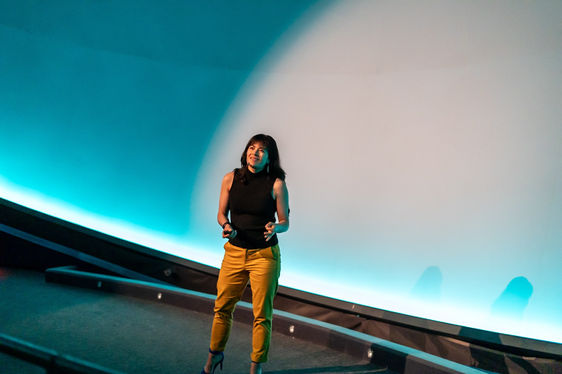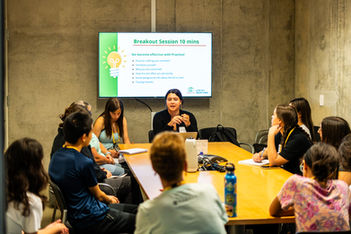

BAYCS 2023
The 4th annual Bay Area Youth Climate Summit was held on October 14th, 2023, generously by the California Academy of Sciences in San Francisco.


4th Annual Bay Area Youth Climate Summit
Saturday, 9 AM - 3:30 PM, October 14, 2023
On October 14th, we gathered around our 4th annual Bay Area Youth Climate Summit, hosted at the California Academy of Sciences in San Francisco! We built community with over 230 youth, educators, & climate leaders, representing 93 high schools from the Bay Area & beyond for an incredible day of knowledge-building, community resilience, & change-making! The summit included guest speakers, workshops, & lunch activities!
Location:






























Keynote Speaker

A Hopeful Climate Horizon: Bridging Climate Cognition & Systemic Change
Keynote By: Molly Kawahata (she/her)
Molly Kawahata is the founder of Systemic Impact Strategies, a former White House climate advisor in the Obama Administration, and the subject of the Patagonia film, The Scale of Hope (2022). Her works center around harnessing psychology to reframe societal narratives with hope and empowerment. She is a Board Member of the Environmental Voter Project and an Advisory Council Member of the AAPI Victory Fund.
Workshops & Speakers
Check out our many different workshops and speakers!
Morning Workshops

Responding to the climate catastrophe may be the single greatest challenge that the human species has ever faced, and it will surely require all of the creativity, empathy, and good will that each of us can muster. And yet, the very same factors that are harming the global environment also present new and exacerbated harms to human mental health. In this presentation, Dr. Debra Safer and Kyle Lane-McKinley of the Climate Change & Mental Health Special Initiative of the department of Psychiatry at Stanford University facilitated a conversation which identifies and unpacks the threats to mental health that climate change presents, and, conversely, how practices which support strong community resilience and wellbeing can result in positive feedback loops which protect us from the worst impacts of climate change.

Mycoremediation is the act of using fungi to heal contaminated soil and water. In this workshop, guests learned the answers to the following questions. How can we harness the power of mycoremediation at school sites? What are other forms of bioremediation that are underexplored? How has Mycelium Youth Network's Youth Leadership Council harnessed the power of Youth Participatory Action Research and science to think about local climate futures?

Do you love to take pictures of nature? This workshop, led by Cal Academy researcher and naturalist, Dr. Rebecca Johnson, uncovered ways to understand the plants and animals you see and how such observations help inform decision-making and conservation planning. Dr. Johnson discussed the work of the Academy's Center for Biodiversity and Community Science and the Thriving California Initiative, and attendees went outside to apply their own observations to Cal Academy’s rich botanical exhibit!

In the workshop, attendees learned how to be a sustainable fashion advocate! The workshop was hands-on as attendees learned how to deconstruct a pair of jeans and use the denim to make flowers or feathers for accessories. The keychains/earrings necklaces were take-home reminder of the natural elements and a connection to the possibilities that can come from waste and how we can protect our ecosystem.

Katy Morsony discussed wildfire prevention, affordability, and their impact on California's clean energy transition. She also highlighted the importance of affordable utility rates in maintaining essential services and housing stability, drawing from her experience as an energy lawyer challenging billion-dollar utility programs.

As the climate crisis and its effects accelerate, stories chronicling “unprecedented” disasters and the toll of the continual burning of fossil fuels flood the news media. Just this summer, Earth experienced its hottest temperatures ever, prompting fires globally. Youth growing up in the context of such catastrophes are inundated with paralyzing news reports, leading to inaction. With rising levels of news-induced eco-anxiety, what do the responsibilities of a climate journalist become? How do climate reporters consider their stories’ impact? What strategies do climate journalists implement to inspire action? How is climate storytelling changing? This panel discussion involved climate reporters from KQED & the San Francisco Chronicle! Attendees engaged with them through Q&A and a “pitching” session where they voiced their ideas.

This workshop dove into the work of The Marine Mammal Center, the world’s largest marine mammal hospital! They advance global ocean conservation through rescue and rehabilitation, scientific research, and education. In this workshop, attendees put themselves in the shoes of various members of the Center and learned how they safely interact with marine mammal patients, feed them at the hospital, and navigate discussions about topics like climate change.
Afternoon Workshops

As a city agency, the SF Environment Department advances climate protection & enhances quality of life for all San Franciscans. The Department is charged with implementing the city’s Climate Action Plan (CAP) through the values of Equity, Credibility, Collaboration, Innovation, & Impact. In this workshop attendees learned about SF's fascinating & complex CAP, while stepping into the shoes of a commissioner & learning how to pass environmental ordinances through a scan tool!

Citizens’ Climate Lobby is a climate change organization that exists to create the political will for a livable world by enabling individual breakthroughs in the exercise of personal and political power. This workshop focused on how policy work can shape the cleantech market and in turn make a tangible impact in the daily life of citizens. Guests learned about the encouraging progress being made in deploying clean technology solutions, forecasts predicting how fast they will continue to grow, policy solutions that would help accelerate these trends, and the best actions you can take to help solve the climate crisis!

How can queer theory and queer politics radically reshape our understandings of the environment, climate change, and the place of humans in the natural world? Queer people and queer communities, especially those lying at the intersection of other marginalized identities, are disproportionately vulnerable to the impacts of a changing climate. At the same time, queer politics and queer theory offer unique and important perspectives on interdependence, belonging, survival, and coalitional possibilities. In this workshop, we explored the field of queer ecology and its deep applicability to climate action. Along the way, we drew from queer theory and queer activism to interrogate and trouble normative understandings of “the human,” “the environment,” “the Anthropocene,” “the State,” and “the future.”

Acterra is a Bay Area-based organization dedicated to bringing people together to create local solutions to prevent climate change. Crystal Hernandez, an Electrification and Education Fellow with Acterra, led a workshop on local advocacy and environmental justice. Attendees learned about advocating effectively, utilizing public comment, using different letter writing strategies, and the intersection between advocacy and environmental justice!

San Francisco Baykeeper defends the health of San Francisco Bay, its watershed, and Bay Area residents. This workshop discussed the law and policy tools Baykeepers uses to investigate and stop water pollution, and ultimately hold industrial polluters accountable. Guests experienced how they work from first identifying industrial water pollution, to gathering evidence, to stopping illegal and harmful conduct.

Youth United for Community Action (YUCA), is a grassroots community organization created, led, and run by young people of color, majority from low-income communities, provides a safe space for young people to empower themselves and work on environmental and social justice issues to establish positive systemic change through grassroots community organizing. YUCA touched on current projects, history in the EPA, and how they do their campaign work. The workshop included an activity around youth organizing which was led by their youth organizers.

This workshop dove into the work of The Marine Mammal Center, the world’s largest marine mammal hospital! They advance global ocean conservation through rescue and rehabilitation, scientific research, and education. In this workshop, attendees put themselves in the shoes of various members of the Center and learned how they safely interact with marine mammal patients, feed them at the hospital, and navigate discussions about topics like climate change.
Lunch Activities
climate breakout sessions & art-making activities






